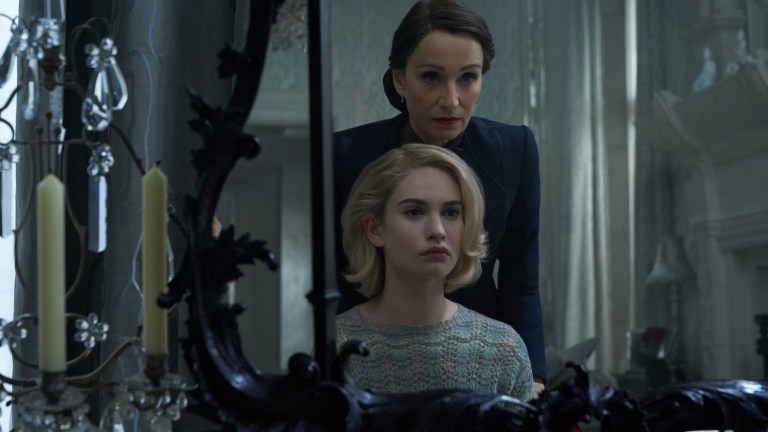Rebecca Ending Explained: Netflix Thriller With a Dark Twist
Ben Wheatley’s new Netflix adaptation of Daphne Du Maurier’s Rebecca has a modern twist.

This article contains Netflix’s Rebecca spoilers.
Taking on a new adaptation of a classic novel is daunting enough, but factoring in that the story was previously translated to the screen by Alfred Hitchcock, produced by David O. Selznick and starring Laurence Olivier and Joan Fontaine – a film that would win the Oscar for Best Picture – makes it a particularly bold move. As we point out in our review though, it works, and in part because Wheatley has hewn closer to the book in some respects but also added modern themes and sensibilities – particularly towards the end.
You’ll remember that Rebecca is the story of a young woman (Lily James) working as a lady’s companion, who meets handsome and affluent widower Maxim De Winter (Armie Hammer) and quickly becomes his second wife.
Maxim takes the second Mrs. De Winter (we never discover her own name) to his stately mansion, Manderley, where they meet Mrs Danvers (Kristin Scott Thomas) the steely housekeeper who idolised Maxim’s first wife Rebecca. Rebecca, the second Mrs. De Winter learns, was vibrant, radiant and adored by all – she can’t possibly compete and every time she tries to do something nice for Maxim – like reviving the annual ball Rebecca used to hold – something goes wrong, usually orchestrated by Mrs. Danvers.
The new Mrs. De Winter is naive, innocent and guileless – or at least at first she is – and after the catastrophic ball is almost goaded into suicide by Danvers. But a nearby shipwreck changes everything.
In the boat is the body of Rebecca – even though Maxim had previously identified another corpse as her first wife and buried her – and it looks like the boat has been tampered with.
The second Mrs. De Winter confronts her husband, who admits that he hated Rebecca – that she tormented him and cheated on him repeatedly and that finally, she came to him, telling him that she was pregnant with a child that wasn’t his. Maxim says he couldn’t divorce her because of the damage to his reputation, nor could he stand the idea of a child not of his bloodline inheriting his name and estate, so he shot and killed Rebecca then put her in a damaged boat which he sent out to sea.
It’s a turning point for Mrs. De Winter 2.0 – shoot Maxim (he hands her the gun and implores her to) or stand by him. And here she chooses the latter.
It’s at this point Wheatley’s film deviates from Hitchcock’s. In the 1940 version Rebecca hit her head and died during a fight with Maxim – it wasn’t out and out murder. That Wheatley’s (and Du Maurier’s) Maxim is a man who would shoot and kill a woman he thinks is pregnant rather than risk his estate and reputation, has a very different nuance.
In deciding to stand by this man, our heroine is on a dark path.
In this version of Rebecca, Wheatley’s women have agency. It’s the narrator who wants to attempt to bribe Jack Favell (Sam Riley), Rebecca’s cousin and lover, who believes himself to be the father of Rebecca’s unborn baby and has a note from Rebecca asking him to meet her the night of her murder.
It’s Danvers who reveals this act in court the next day, including the note and the fact that Rebecca had asked Danvers to take out her clothes because of a swelling wasteline, giving Maxim a clear motive, and undoing the previous defence that Rebecca’s death was suicide.
It’s the second Mrs. De Winter who made the dubious decision to track down Rebecca’s private doctor – with the initial intent of destroying the records which show Rebecca was pregnant – obstructing a police investigation, and attempting to protect a murderer. And although when she breaks in and finds the records which show that Rebecca was not in fact pregnant but in the late stages of cancer, she was still willing to pervert the course of justice for a killer.
Danvers has agency throughout, attempting to sabotage and undermine Maxim’s new wife at every turn. So it’s fitting that in the Wheatley version there is no doubt at all that it is she who has burned Manderley and the boat house to the ground, and rather than dying in the blaze, she throws herself into the sea, perhaps to be closer to her beloved Rebecca whose body had lain in those same waters for so long.
The character of Rebecca here, created only by the memories of the living, is a mysterious and ambiguous creature too. While Maxim talks of the torment he suffered at her hands, he is far from reliable. Instead we see him to be sullen, controlling, proud and aloof – hardly an ideal husband.
Even with his innocent new wife, he flips his lid when she wears a dress like one Rebecca wore to the ball – his new wife could never have known, and publicly humiliating her isn’t the behaviour of a kind man. Maxim cares more about his pride, his name and his property than the life of a woman and child. Is it possible then that Rebecca was not a fallen temptress but a woman fed up with her difficult husband and trapped in a loveless marriage, who decides not to be crushed?
Danvers loves Rebecca, and so does not judge her, instead describing a woman who wouldn’t be shackled by the men around her.
“She despised you all, you were nothing but play things, why shouldn’t a woman amuse herself?” She barks at Frank Crawley (Tom Goodman-Hill), another of Rebecca’s would-be lovers. “She lived her life as she pleased, no wonder a man had to kill her.”
It’s a line that has real resonance, particular for a modern audience. Rebecca is a woman who chose her own path. When Maxim couldn’t control her he killed her. Sure Danvers is biased, but her version of Rebecca is not necessarily any more skewed than Maxim’s. Is Danvers the villain of the piece? Is Rebecca? Or is it Maxim?
Wheatley’s version leans into the ambiguity that was present in Du Marier’s novel – who was Rebecca, really? Who is Maxim really? And who does the narrator become?
This last question is at the heart of the ending of Wheatley’s film. Before Danvers plunges into the sea in her final act of defiance she tells the narrator, “I know you’ll stand by him but you’ll never know happiness.”
To which she replies, “yes I will.”
And perhaps she will. Because the second Mrs. De Winter is clearly no longer willing to live in anyone’s shadow.
Maxim notes the change in his wife, saying that what he hates most about Rebecca is the effect she’s had on his new wife.
“What she’s taken from you, it’s gone forever. That funny, young, lost look I love – you’re not that person anymore.”
“Don’t hate her for that,” the second Mrs. De Winter replies.
Of course Maxim would miss his pliable, innocent young wife, but instead he made her accessory to murder after the fact. You can’t have it both ways. This is not something Rebecca has done, it is something Maxim has done.
As an aside this film takes on a slightly different life in the context of the recently released Netflix documentary American Murder: The Family Next Door which documents the aftermath of the horrible case of Chris Watts who killed his pregnant wife and two daughters, for no other obvious reason than to go off with his new girlfriend. Rebecca is part gothic chiller, part mystery, part melodrama (and part courtroom drama in this version) but any sense of romance here is tinged with horror.
It’s with this note of darkness that the movie ends. The second Mrs. De Winter awakes from a nightmare – her dream of Manderley and Danvers. She and Maxim are in a hotel room in Cairo, a stop along the way on their quest for a new home. Looking in the mirror, smoking a cigarette (earlier we see her recoil from Favell’s cigarette smoke), she says she can see the woman she is now and knows she made the right choice. “To save the one thing worth walking through flames for. Love.”
But her final look to camera, followed by the sound of a watery splash suggests something more sinister. No longer overshadowed by Rebecca, her battle with Danvers culminating in a woman’s suicide, she now has the man she loves, as well as the wealth and status that comes with it, but at what cost? She knows that her husband is a murderer who killed what he thought was a pregnant woman rather than divorce her – and she condoned that. She has emerged anew from the ashes of Manderley, strong, rich and in control.
A happy ending? For her perhaps, but for the viewer? Well that’s a whole lot more complex.


